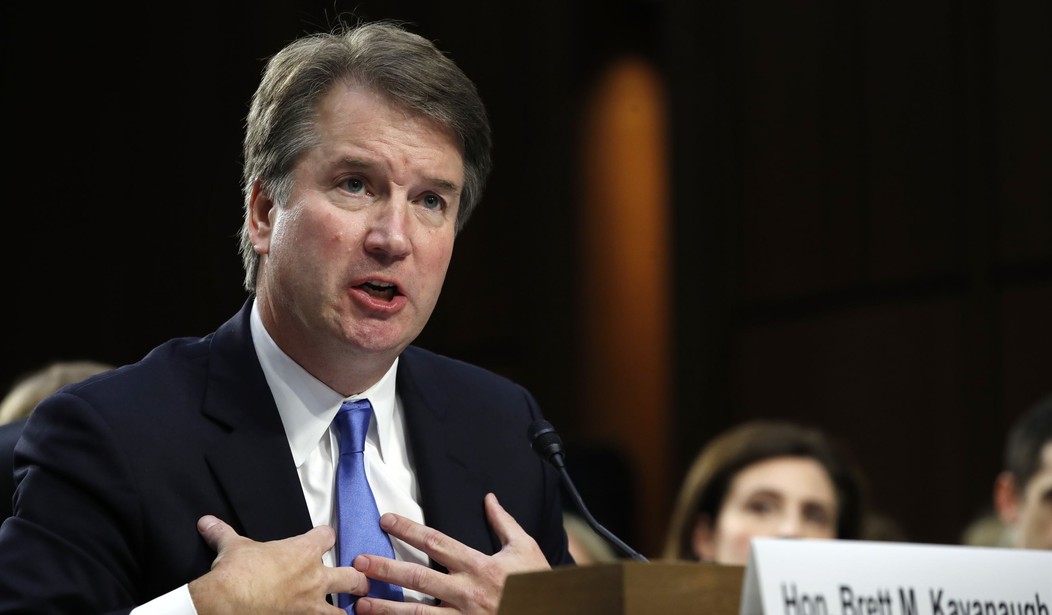Thursday marks the third day of confirmation hearings for Supreme Court nominee Brett Kavanaugh. He has given a rather spotless performance so far before the Senate Judiciary Committee, but one question gave some pro-life advocates pause.
During Sen. Dianne Feinstein's (D-CA) half hour of questioning on Wednesday, she asked the nominee for his perspective on Roe v. Wade, the 1973 ruling that gave individuals the right to abortion. Democrats have voiced concerns about Kavanaugh and whether he would help overturn Roe, since his confirmation would tilt the Supreme Court conservative. Kavanaugh admitted to Feinstein that the court ruling was precedent, and Casey v. Planned Parenthood, which confirmed Roe, was "precedent on precedent."
That may worry some pro-lifers, but the website LifeNews observed that Kavanaugh did not say that there is a "right" to abortion. The editors applauded the nominee for "declining to take the bait."
Then, on Thursday morning, we got a new New York Times piece that said they had obtained an email revealing that Judge Brett Kavanaugh once questioned a draft email from a group of conservatives that read all legal scholars consider Roe v. Wade the “settled law of the land.”
“I am not sure that all legal scholars refer to Roe as the settled law of the land at the Supreme Court level since Court can always overrule its precedent, and three current Justices on the Court would do so,” Kavanaugh reportedly wrote in 2003, when he was a lawyer in the George W. Bush White House.
Recommended
Feinstein had an opportunity to ask Kavanaugh about the newly released email and what he meant by it.
"It was referring to views of legal scholars," Kavanaugh said. His "broader point" was that it was "overstating something about legal scholars."
Roe v. Wade "is an important precedent," he added.
However, when she met with Kavanaugh last month, Sen. Susan Collins (R-ME) claimed the nominee did tell her that Roe was a settled matter.
When asked for his own perspective on Kavanaugh's Roe answer at the hearings on Wednesday, Sen. Ben Sasse (R-NE) told Hugh Hewitt that he was a bit perturbed by that wording. His concern, however, appeared to be more about constitutional principle than the right to life.
HH: Now there are points in the Kavanaugh hearings where we also have circus. But there was a lot of substance yesterday. I want to focus on the substance, most particularly this. My pro-life friends are concerned that Judge Kavanaugh in his exchange with Senator Feinstein said precedents on precedents are important, Casey, in that case, confirming Roe, and that precedents on precedents have to be studied as such. But his favorite case, Brown V. Board, the highlight, the number one case, the most important moment in Supreme Court history, is the reversal of a precedence on precedence, Plessy, which was itself wrongly decided 58 years after it was wrongly decided. So what would you say to pro-life people about what you heard Judge Kavanaugh say about precedence on precedence yesterday, Senator Sasse?
BS: Have you hacked my laptop, Hugh? I literally, we are, we are singing off the same song sheet. I plan to, I had planned to focus on 1st Amendment issues today. I get 20-22 minutes early this afternoon, and I think I’m going to do exclusively precedent for reasons exactly related to what you’re saying. I mean, A) it is complicated stuff before we even get to Roe and pro-life issues. But B) it’s complicated stuff that the American people really haven’t ever had debated in front of them. So there’s a lot of reasons why thoughtful, hard-working Nebraskans who are smart and engaged don’t really know how to think about precedent, because it’s not stuff we’ve dealt with. And it seems to me that he’s saying two different things which are reconcilable, but I’m worried about some of the gray line between them. On the one hand, when there’s a precedent, you don’t want every circuit court in America to be making up their own decisions about whether or not that precedent is a precedent that’s a big deal. On the other hand, Plessy. I mean, there are obviously cases where, situations where cases have been wrongly decided, and they need to be overturned. And no matter how many times people use words like superprecedent or precedent on precedent, or confirmed precedent, it still doesn’t change the fact that, and precedent does, as he rightly says, go all the way back to an understanding that’s in Article III proper. But it doesn’t mean that there are never decisions that are wrong. And so I want to hear him talk about that, and how we know when things are wrong why when Brown V. Board in 1954, which is indeed one of the most important moments in not just Supreme Court history, but American history, why you would know that 58 years after Plessy, it was wrong and should be overturned, and other ones sound like they’re sacrosanct.
























Join the conversation as a VIP Member